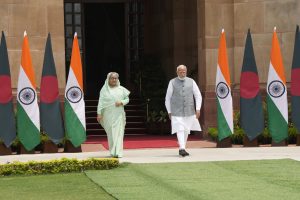The political turmoil in Bangladesh has brought former Prime Minister Sheikh Hasina to the forefront, not just in her homeland but also across the border in India. The mounting demands for her extradition might throw India into a diplomatic conundrum, putting its bilateral relations with Bangladesh to the test.
As public sentiment in Bangladesh calls for Hasina’s repatriation to face charges, the question arises: Can India refuse an official request from the current interim government of Bangladesh for her extradition? And how does the India-Bangladesh extradition treaty guide this process?
The extradition treaty between India and Bangladesh, initially signed in 2013 and amended in 2016, was a strategic measure aimed at addressing the issue of insurgency and terrorism along the shared borders of the two nations. The primary intent of the treaty was to streamline the process of extraditing fugitives and criminals, especially those engaged in activities that pose a threat to national security. It emerged from a shared concern to tackle the issue of Indian insurgents finding shelter in Bangladesh and Bangladeshi militants operating from Indian territory.
The treaty includes important provisions that require both countries to extradite individuals who have been charged with or convicted of crimes that carry a minimum punishment of one year of imprisonment. The principle of dual criminality is crucial here, which requires that the crime for which extradition is requested must be recognized as a punishable offense in both countries. Additionally, the treaty covers attempts to commit, aiding, abetting, inciting, or participating as an accomplice in such crimes.
Sheikh Hasina, who is currently facing multiple levels of serious charges in Bangladesh, including murder, enforced disappearance, and genocide, finds herself in a precarious position. Given her political stature and the nature of the charges, it may be challenging for her to seek asylum in India. Nevertheless, the extradition process underwent a significant change due to the 2016 amendment. The amendment of the treaty resulted in a lower threshold for extradition, eliminating the need for evidence and thereafter only requiring an arrest warrant from a competent court in the requesting country.
In light of the current situation, if the interim government of Bangladesh were to formally request the extradition of Hasina, it is evident that India is legally bound by the treaty to proceed with the extradition, unless there are valid reasons for refusal.
Article 6 of the extradition treaty discusses an exception for political offenses, allowing refusal of extradition if the offense is deemed to be of a political nature. However, there are strict limitations on this particular exemption. A detailed list of offenses, including murder, terrorism-related crimes, and kidnapping, are explicitly excluded from being considered political. It seems improbable that India could characterize the accusations against Hasina as political transgressions in order to rationalize rejection, considering the gravity of the allegations.
Another basis for refusal is outlined in Article 8, which includes situations where the accusation was not made with good faith in the interests of justice, or if the offense is a military one not recognized under general criminal law. India could potentially refuse extradition on the basis that the charges against Hasina are not made in good faith, a stance that might find support given her long-standing relationship with India and the strategic importance of maintaining good relations with Bangladesh.
However, any refusal to extradite could strain diplomatic ties between New Delhi and Dhaka’s new ruling dispensation. On the other hand, extraditing Hasina could also have far-reaching implications for India’s relationship with various political factions within Bangladesh, particularly if the extradition is seen as India abandoning a long-time ally.
India finds itself on a tightrope over a minefield, juggling legal commitments under the treaty with broader geopolitical and diplomatic considerations. However, legal experts and former diplomats argue that national interests frequently take precedence over legal procedures in such circumstances.
A refusal to extradite, regardless of legal considerations, could be seen as a diplomatic snub to the interim Bangladeshi government, thereby jeopardizing current bilateral relations. In contrast, agreeing to the extradition request may alienate important political forces in Bangladesh and India, where Hasina is regarded as a long-time ally and strategic partner.
As the case against Sheikh Hasina unfolds, India must carefully navigate the complex interplay of public sentiment, diplomatic relationships, and legal obligations under the extradition treaty. While the treaty’s language provides clear guidelines on the grounds for extradition and refusal, the broader implications of any decision will likely extend beyond the legal framework. Ultimately, whether India decides to extradite or refuses will hinge on a delicate balance of maintaining regional stability, upholding diplomatic ties, and managing the public and political ramifications on both sides of the border.
































